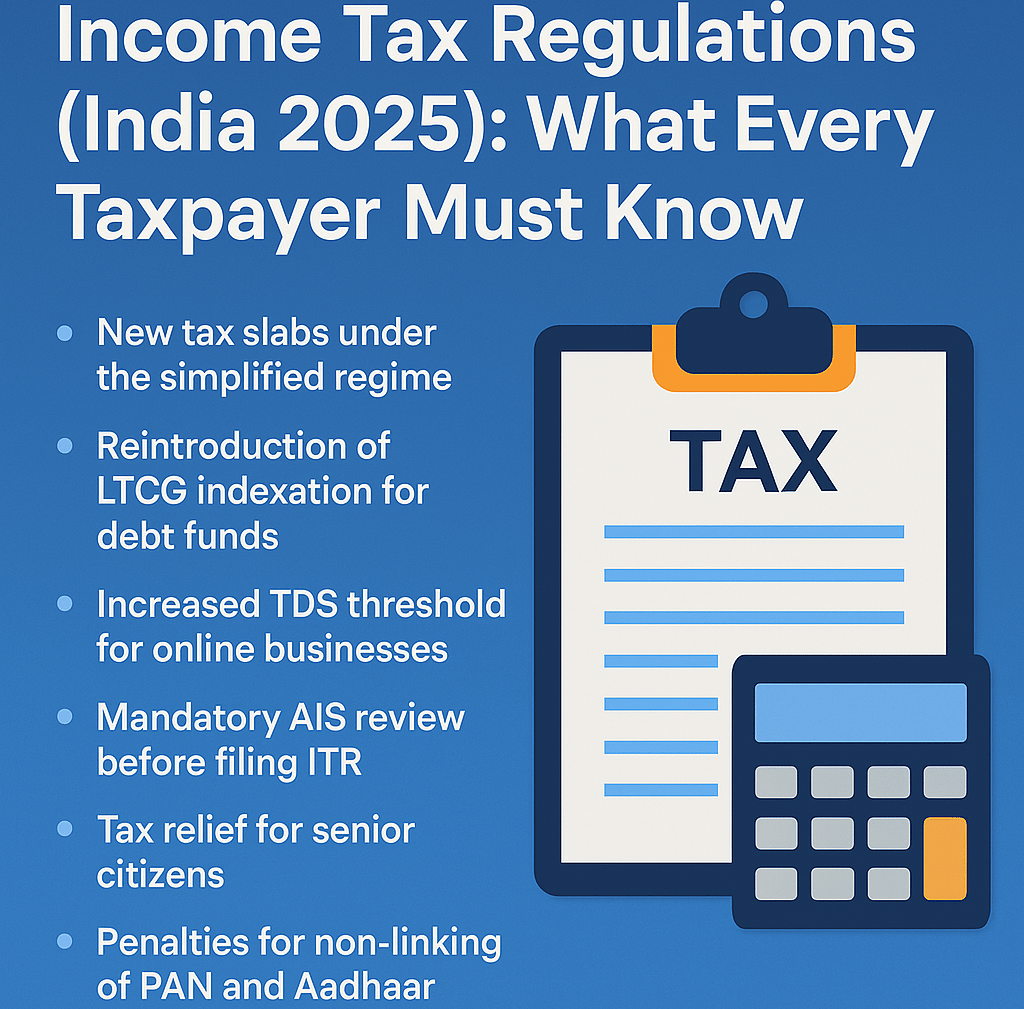Changes in Income Tax Regulations India 2025 – What Indian Taxpayers Must Know
4/10/20253 min read


Changes in Income Tax Regulations (India 2025): What Every Taxpayer Must Know
The Indian tax landscape is evolving rapidly, and the fiscal year 2025 has introduced some significant changes to the Income Tax regulations. Whether you are a salaried individual, a small business owner, or a high-net-worth investor, understanding these updates is crucial to ensuring compliance and optimizing your tax planning strategies.
In this blog, we explore the most impactful changes in the Income Tax Act and what they mean for you as a taxpayer in India.
New Tax Slabs Under the Simplified Regime
To promote wider adoption of the new tax regime, the government has revamped the tax slabs under Section 115BAC. The revised structure for FY 2025-26 is more straightforward and aims to benefit middle-income groups.
Key Highlights:
No tax up to ₹3 lakh
5% for ₹3–6 lakh
10% for ₹6–9 lakh
15% for ₹9–12 lakh
20% for ₹12–15 lakh
30% above ₹15 lakh
While deductions like HRA and Section 80C are not available in the simplified regime, the lower tax rates can be beneficial for those without significant exemptions.
Reintroduction of LTCG Indexation for Debt Funds
One major reform is the reinstatement of indexation benefit on long-term capital gains (LTCG) for debt mutual funds held over three years. This move aims to promote long-term investing and level the playing field between equity and debt investments.
This change is expected to attract conservative investors back into debt schemes, making them more tax-efficient than before.
Increased TDS Threshold for Online Businesses
For influencers, freelancers, and e-commerce sellers, the TDS (Tax Deducted at Source) threshold has been increased under Section 194R and 194O. Now, earnings up to ₹50,000 in a financial year will be exempt from TDS deductions.
This is a welcome relief for small creators and gig workers who faced compliance challenges due to lower limits in earlier years.
Digital Tax Compliance: Mandatory AIS Review
The government is pushing for greater transparency through the Annual Information Statement (AIS). In 2025, reviewing your AIS before filing your ITR has become mandatory. Any mismatch between reported income and AIS entries could trigger scrutiny or notices.
Hence, it is essential to check the AIS for:
Interest income
Capital gains
Foreign remittances
High-value transactions
With this, income tax filing has become more data-driven, reducing the chances of manual errors or concealment.
Tax Relief for Senior Citizens
Senior citizens (above 75 years) receiving only pension and interest income from specified banks are now exempted from filing ITR, provided tax is already deducted at source. This step reduces the compliance burden and provides relief to elderly taxpayers.
Additionally, health insurance premium deduction limits under Section 80D have been marginally increased to support rising medical expenses in retirement.
Penalties for Non-Linking of PAN and Aadhaar
Despite multiple extensions, April 1, 2025 is the final deadline to link your PAN with Aadhaar. Failure to comply will result in an inoperative PAN, leading to:
Invalid ITR filings
Higher TDS/TCS rates
Loss of refund eligibility
Taxpayers must verify and complete the linkage process immediately to avoid disruptions.
Changes in Tax Audit Thresholds
The tax audit limit under Section 44AB for businesses opting for digital transactions has been revised from ₹10 crore to ₹15 crore. This move incentivizes digital adoption and eases compliance for MSMEs.
However, businesses must maintain digital transaction records and ensure accurate reporting under the revised criteria.
Final Thoughts
Income tax compliance in India is becoming more digital, dynamic, and data-sensitive. With new slabs, indexation updates, TDS reliefs, and AIS mandates, every taxpayer must stay informed to make smart financial decisions.
To simplify your tax journey, consult professionals who can guide you based on your specific income sources, exemptions, and goals. At One Solution, we provide customized tax planning, investment advisory, and support for filing accurate ITRs on time.
Related Blogs:
About One Solution
Quick Links
Contact Info
One Solution — Your trusted partner for financial success.
📍 F17, Grand Plaza, Paltan Bazar
Guwahati, Kamrup (M), Assam
India, Pin: 781008
📞 9650072280
© 2025 One Solution. All Rights Reserved.
